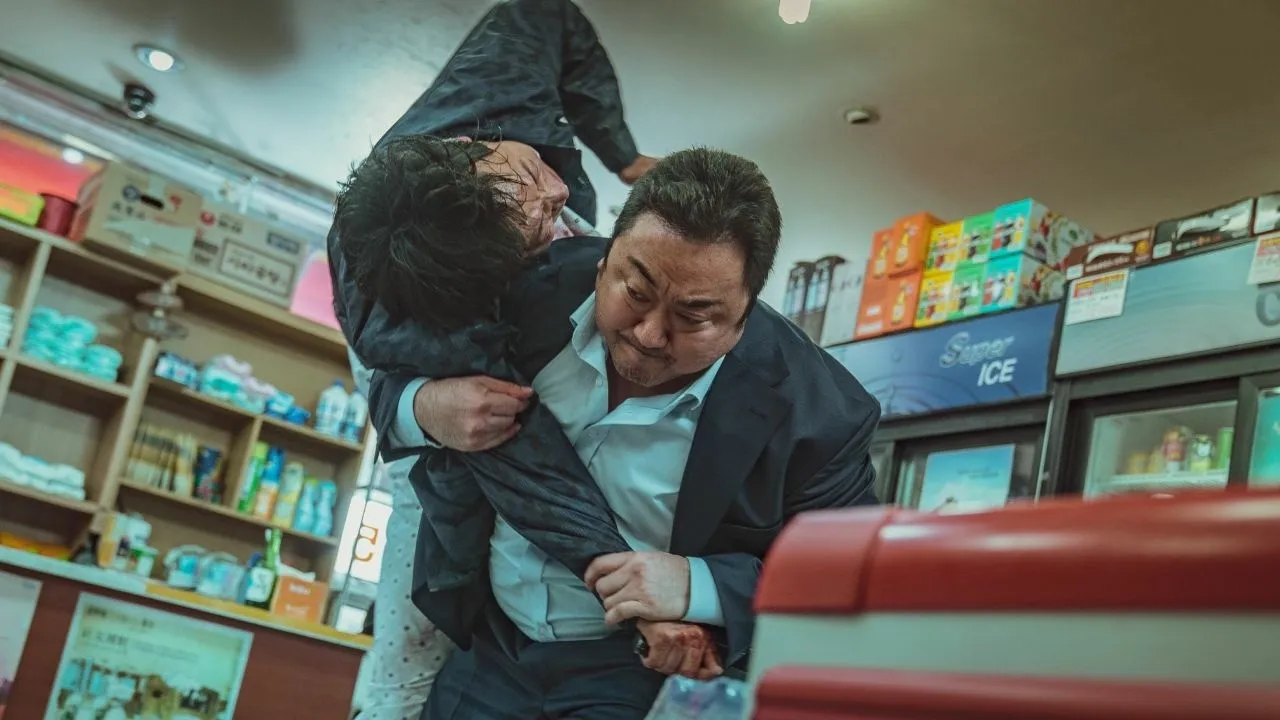LEAFF 2022: ‘The Roundup’ Review

Originally published on 08/12/22 for the UCL Film & TV Society's Journal
Since his introduction to Western audiences as a veritable battering ram in Train to Busan, Ma Dong-seok’s unmistakable silhouette has only grown in magnitude, imbuing each of his performances with the enchanting aura of a genuine movie star – something that is growing rarer and rarer. His penchant for wordless, weighty movement as a means of conveying a certain stoic charm in films like The Gangster, The Cop, The Devil is reconfigured in the rambunctious physical comedy, The Roundup, a sequel to the action-comedy The Outlaws starring Ma as ‘Beast Cop’ Ma Seok-do. As is evident in the first few minutes of the film, its title is far from exaggerated.
Following the cold open of a business tycoon’s son being hacked to bits by a machete in the back of an SUV, the film cuts to what initially appears to be a liquor store holdup. Jeon Il-man (Choi Gwi-hwa), Ma’s world-weary superior, stumbles onto the scene of the crime, emphasis on ‘stumble’ since almost every cop besides Ma is a bumbling mass of neuroses who slips on their surroundings as though every road were littered with banana peels. A booming guitar riff, however, signals the announcement of Ma’s arrival, who stares in befuddlement at the knife-wielding criminal. After his rather unenthusiastic proposal to put down the knife is rejected, Ma’s fist and the hapless crook’s face connect, producing a resounding blow that indicates at least a broken nose, if not the displacement of a couple more bones. Ma Dong-seok’s role is that of the archetypal Dirty Harry, a loose-cannon cop with a predilection for excessive force, whose extrajudicial ventures always push him to the brink of an early tenure but simply can’t quit. It’s a well-worn trope, but Ma wears it with bumbling zeal, always leveraging the threat of jackhammer-esque biceps in interrogation sequences that recall a Farrelly Bros. comedy more than anything approaching intimidation. Ma’s outsized personality serves as bane as well as boon, as his performance is so electrifying that renders the papier-mâché narrative even more hackneyed than it already is.
Much of The Roundup swerves unsteadily between a pastiche of serial killer thriller and vignettes of physical comedy, the latter being a welcome reprise from the unbearably dull, tensionless former. The few feeble grasps the film makes towards some semblance of gravitas are equally misguided. In that their attempts to arouse empathy for victims established as ruthless business tycoons seems diametrically opposed to the film’s irreverence towards just about any form of authority.
That lack of dramatic tension isn’t just restricted to these failed attempts at catharsis, since what should be the film’s centerpiece – Ma Dong-seok carelessly dispatching an armada of goons with his bare fists – is plagued by a total absence of stakes. A one-take brawl in an apartment between Kang Hae-sang (Son Suk-ku), a charismatic killer, and a squad of cops is impressive in its physicality, particularly in its leveraging of space as a means of structural improvisation. Once Ma arrives on the scene, though, the impressive action dissipates, and is subsumed by pure personality. Watching him navigate around the snug apartment interior like an elephant in a china shop, whilst slamming Kang into walls, is amusing enough, but any life-or-death stakes become irrelevant the moment he enters the frame. Carefully-constructed skirmishes are obliterated by Ma’s fists as they make a beeline for someone’s face. In fact, much of the film revolves around creating increasingly elaborate scenarios to prevent Ma, a seemingly omnipotent colossus, from being in the same room as his perfunctory antagonists, as all dramatic tension is deflated the minute he enters a room. In much the same vein, little attention is paid to character blocking outside of ensuring that Ma is rendered as ostentatiously present as possible. Being a one-man show isn’t inherently detrimental, but when The Roundup refuses to fully commit to either a showcase of its star or a well-constructed thriller, there seems to be little purpose to anyone or anything in the frame besides Ma.
Though the total absence of any emotional undercurrent fails the film, its employing of physical comedy propels it beyond mediocrity. The positioning of Ma Dong-seok as a charismatic vortex, who draws the film’s surroundings towards him, risks the possibility of tiresome quips, something that is refreshingly avoided. Instead, much of the comedic value is derived from the dryness of Ma’s no-nonsense disposition and the mortified expressions of his colleagues. He breaks just about every rule in the book by bulldozing petty thugs and swindling businessmen alike with all the delicacy of the Kool-Aid Man running through walls.
These sequences gradually unspool into dioramas of a much grander scale, particularly during a climactic showdown where Ma tenderizes a doomed killer’s face before slamming it through a windshield. Such brutality is sparse in a film so committed to refraining from establishing any sort of genuine tension, but when it does occur its tactility is satisfyingly impactful. In these brawls, the PG-13 veneer of light-heartedness gives way to a genuine brutality, with Ma Dong-seok punching straight through it. That impact, however, cannot tear through the conspicuous layer of reactionary nationalism lying behind the effacing comedy of the film, since so much of its humor is derived from the exoticization of the Vietnamese environment as a veritable abattoir of violence and degeneracy. Positioning the intervening Korean cops as arbiters of justice, combined with the overbearing yellow sheen of the Vietnam segments, renders an otherwise cheery extended bout of slapstick violence tonally lopsided.
The Roundup elevates Ma Dong-seok to muscle-bound judge, jury and executioner, but it fails to present a compelling enough case for him to enact justice upon.
